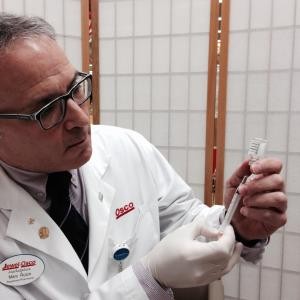Flu Strikes McHenry County
Adela Crandell Durkee — February 4, 2015
Jewel-Osco Registered Pharmacist Marc Rubin administering flu vaccines. // Photo Adela Crandell Durkee
The flu is downing people left and right in McHenry County, even those who received the vaccine. Why? Isn’t the flu just a part of life? Why should someone with a healthy immune system get the vaccine? And what about children? Don’t some people get the flu from the vaccine? Isn’t the strain of flu spreading now different than what’s in the vaccine?
Each year, the CDC offers a vaccine that contains what experts think will be the most likely strains to impact the population. This season’s (2014-15) vaccines contain protection against up to four different strains. About half of the flu virus this season is mutated from the strains used in the vaccine. But the flu season is still in full swing, and that number can change. This season’s vaccine is stacking up to be about 59% effective.
Contrary to what many believe, the flu cannot be contracted from the vaccine. That’s because the vaccine contains attenuated (changed), inactivated (dead), or recombinant (modified) virus. There are two reasons why people think they got the flu from the vaccine. The body gets tricked into thinking the vaccine is the real flu, so it activates an immune response associated with the flu: antibodies, muscle aches, and a low-grade fever for a couple days. Sometimes people believe they got a mild case of the flu. But the antibodies produced by this faux flu arms the body for a real flu. The other reason people often think they contracted the flu from the vaccine is because they wait too long. It takes about 2 weeks for flu antibodies to develop. Often people wait until the flu strikes the neighborhood. The delay fails to give the body enough time to build up its arsenal of defense and the flu gets the upper hand.
Experts recommend vaccinations for everyone over 6 months old unless the person has severe life-threatening allergies or has Gulllain-Baré Syndrome. If someone already feels ill, he should wait to get the vaccine.
Part of the reason to get a vaccination is for self-protection. Another important reason is to protect others. Flu vaccination can help protect people who are at greater risk of getting seriously ill from flu, like older adults, people with chronic health conditions and young children (especially infants younger than 6 months, who are too young to get vaccinated).
• Flu vaccination may make your illness milder if you do get sick.
• Flu vaccination can reduce the risk of more serious outcomes. Studies show:
• 74% reduction in pediatric intensive care unit admission;
• 92% effective in protecting infants for six months after birth when a pregnant mother is vaccinated.
• 71% reduction in flu-related hospitalizations among adults of all ages;
• 77% reduction among adults 50 years of age;
• Lower rates of cardiac events among people with heart disease, especially among those who had had a cardiac event in the past year;
• 79% reduction in hospitalizations among people with diabetes;
• 52% reduction in hospitalizations among people with and chronic lung disease.
• 61% reduction in the risk of flu-related hospitalizations in older adults over 50 years old.
The CDC recommends the nasal mist vaccine for children between the ages of 2 and 8 years. Besides being nearly painless, the mist vaccine seems to be more effective for children.
There is even a flu shot for those with serious allergies. This group should request the attenuated vaccine.







